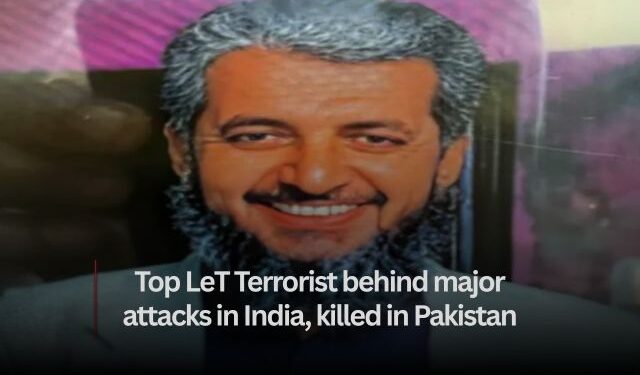In a significant development, Saifullah Khalid, a top commander of the Lashkar-e-Taiba (LeT) terrorist organisation, was gunned down by unknown assailants in Pakistan’s Sindh province on Sunday, May 18, 2025.
The killing marks a major setback for the UN-proscribed terror group, which has been responsible for several high-profile attacks in India, including the infamous 2008 Mumbai attacks.
According to reports, Khalid was ambushed by unidentified gunmen in Matli, a town in the Badin district of Sindh, where he had recently shifted his base. Sources indicate that he was actively involved in recruitment and fundraising for LeT and its front organisation, Jamaat-ud-Dawa, while operating from Sindh. His death comes amid a series of targeted killings of LeT operatives in Pakistan, though no official claims have been made.
Khalid, often operating under the alias Vinode Kumar, was a key figure in LeT’s operations along the India-Nepal border. He played a pivotal role in facilitating infiltration into India, exploiting the porous border to support terrorist activities. His criminal record includes masterminding several attacks, most notably the 2005 shooting at the Indian Institute of Science (IISc) in Bengaluru, which killed a professor and injured four others, and the 2006 plot to attack the Rashtriya Swayamsevak Sangh (RSS) headquarters in Nagpur. Both incidents underscored his deep involvement in LeT’s anti-India agenda.
Lashkar-e-Taiba, a Salafi-jihadist group with historical ties to Pakistan’s Inter-Services Intelligence (ISI), has long been a thorn in India’s side. The group gained global notoriety for the 2008 Mumbai attacks, where its gunmen laid siege to the city for over 60 hours, killing 166 people. While Khalid was not directly linked to the Mumbai attacks, his role in other high-profile operations made him a priority target for Indian security agencies. The 2001 attack on the Indian Parliament, also attributed to LeT, had brought India and Pakistan to the brink of war, highlighting the group’s destabilising influence in the region.
Khalid’s activities weren’t limited to India. He was instrumental in LeT’s operations in Kashmir, where the group has been active since the 1990s, initially targeting Indian military personnel before expanding attacks to civilians. His role in cross-border infiltration through Nepal also made him a critical link in LeT’s logistical network, often coordinating with third-country nationals to smuggle operatives into India.
The circumstances of Khalid’s killing remain murky. Pakistani officials have not released an official statement, but the pattern of targeted assassinations of LeT operatives in recent years has fueled speculation. In 2023, Muhammad Riaz, another LeT commander, was killed in Pakistan-administered Kashmir, followed by Shahid Latif in Sialkot a month later. Pakistani authorities have previously accused India of orchestrating such killings, a charge New Delhi has consistently denied. India’s Foreign Minister S. Jaishankar has stated that targeted killings abroad are not part of India’s policy, though security analysts suggest these incidents may point to vulnerabilities in Pakistan’s security apparatus.
Security experts view Khalid’s elimination as a significant blow to LeT’s operational capabilities, particularly its recruitment and infiltration networks. However, concerns remain about the group’s resilience. LeT’s historical partnership with the ISI, which has provided financial and military support, has allowed it to sustain its activities despite setbacks. The group’s focus on annexing Kashmir and its history of attacks on Indian soil suggest that it will continue to pose a threat to regional stability.
As investigations into Khalid’s killing continue, the incident underscores the complex dynamics of counterterrorism in South Asia.
For India, the death of a notorious LeT commander is a step forward in its fight against terrorism, but the broader challenge of dismantling terror networks with deep-rooted support structures remains.
For Pakistan, the killing raises uncomfortable questions about its ability to secure its territory and the potential fallout from harbouring terrorist operatives.





























